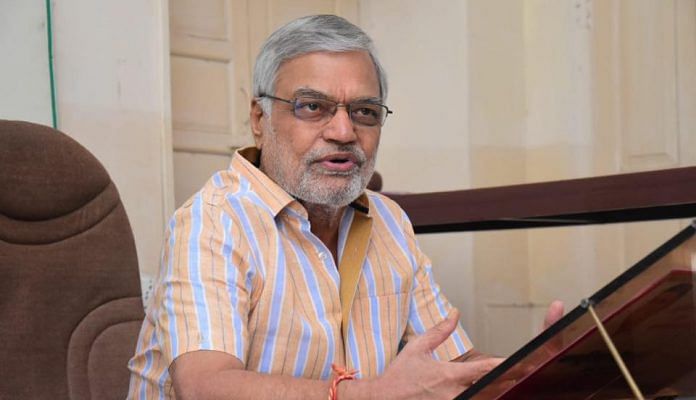New Delhi: When Rajasthan assembly speaker C.P. Joshi lost out on chief ministership in 2008, despite leading the Congress to victory in the assembly elections as the party president, he felt dejected.
After all, he came from Mewar, the region which had given birth to three CMs in the past — Mohan Lal Sukhadia, Hari Dev Joshi and Hira Lal Devpura. But despite his performance as the party president, which had garnered praise from all corners, Joshi could not be made the CM mostly for one major reason — he lost his own seat, Nathdwara, albeit by just one vote.
Ashok Gehlot was chosen as the CM then, but it took Joshi all of one hour to shrug off his grief and go to the Congress office to celebrate the party’s victory.
“I was with him that day, and I was impressed to see just how quickly he was able to collect himself. He is old-school like that — the party always comes first for him,” Satyendra Raghav, Rajasthan Congress spokesperson told ThePrint.
But that did not mean he wasn’t miffed with Gehlot — the latter’s appointment as CM had definitely strained their relationship.
Raghav, who has worked closely with Joshi for over a decade, however, said he hasn’t seen him have a single emotional moment.
“He is a rational mind, and he would never let his emotions get the better of him. He isn’t emotional but whatever he thinks and feels, he says,” Raghav said.
Joshi’s straightforwardness, however, isn’t always received as well by everyone.
A year after the state elections, Joshi won a Lok Sabha seat from Bhilwara and was catapulted to the UPA 2 cabinet as the rural development and panchayati raj minister.
Known to be a man of few words, he was often perceived as ‘arrogant’ and ‘brusk’ in his demeanour — particularly towards civil servants.
Despite this, he continued to get plum positions in the Union Cabinet — he was made the minister for road transport and highways in a cabinet reshuffle in 2011 and given the additional charge of Railways a year later.
Before becoming the Rajasthan assembly speaker in 2018, Joshi served as the general secretary of the All India Congress Committee (AICC) for four years. Last week, Joshi issued a disqualification notice to Sachin Pilot and 18 other ‘rebel’ MLAs — a move that was challenged by the Pilot camp in the Rajasthan High Court.
On Tuesday, the high court asked Joshi to defer action until 24 July on the disqualification notices issued to the 19 rebel MLAs including Pilot. The court will also announce its order on the petition challenging these notices then.
But Joshi has announced that he will file a special leave petition (SLP) in the Supreme Court on the grounds that his “well-defined role is being challenged by the state High Court”.
Also read: Reader View: ‘Pilot’s revolt is justified but not his timing, given Covid pandemic’
Massive ‘failure’ as in-charge of 10 states
From Nathdwara to the central cabinet, to eventually being made Rajasthan assembly speaker — Joshi’s steep rise in the party is credited to his closeness to the Gandhi family.
“He is a hard-core loyalist of the Gandhi family, especially Rahul Gandhi. Joshi has a special place in his heart,” a Rajasthan Congress leader said.
The ‘special place’ is exemplified in how the usual Congress policy of ‘one general secretary, one state’ was put by the wayside for him. Under Joshi’s leadership as the general secretary in-charge of the eight northeastern states as well as of Bihar, West Bengal, and the Andaman and Nicobar islands, the Congress party faced a drubbing in the 2017-18 assembly elections.
In March 2018, Nagaland Congress president Kewe Khape Therie demanded Joshi’s resignation as general secretary in-charge of the northeast.
Therie claimed he had apprised Sonia Gandhi in August 2017 about the party’s condition in the state but nothing was done about it. He also said that Joshi visited the state only once after being made in-charge in June 2016.
Similarly, former Tripura Congress leader Pradyot Deb Barman, who quit the party last year and founded his own outfit, in an interview to ThePrint said that Joshi came to Tripura “for four hours in 4.5 years”.
The former Bihar Congress president, Ashok Choudhary, had told ThePrint in 2018 that Joshi never sought a “better deal for the party” in the run-up to the 2015 state elections, when talks of a ‘mahagatbandhan’ or grand alliance were on. Choudhary went on to join the JD(U) the following year.
“He was a massive failure in these states because he didn’t know these states at all,” Prakash Bhandari, senior journalist and political analyst based out of Rajasthan, said. “A general secretary has to know the party cadre and understand the local politics too, which he never cared for in the states. He knows these things well about Rajasthan.”
Congress’ Brahmin face
Joshi, the party’s ‘Brahmin’ face in the state, adds to the caste mix of the Congress leadership: Gehlot belongs to the Mali caste, while Pilot is Gujjar.
“The Brahmin community is traditionally known to vote for BJP. But as the party president, he emerged as someone who could get the Brahmin votes to Congress,” a Rajasthan Congress leader said.
His close-aides describe him as a “micro-manager” who is “highly invested in state politics”.
“He knows the political history of the state from cover-to-cover. He has a very strong grasp on most the booth-level politics here too,” a close aide said.
However, his popularity and following pale in comparison to that of Gehlot’s — who is seen as a mass leader.
“Joshi is popular, yes. But he doesn’t have a patch on Gehlot,” Bhandari said. “Gehlot is perceived as a leader of the masses. There is a reason why he has been made CM so many times.”
Also read: Congress’ 1970-style treatment of young leaders won’t work. It can learn from BJP



